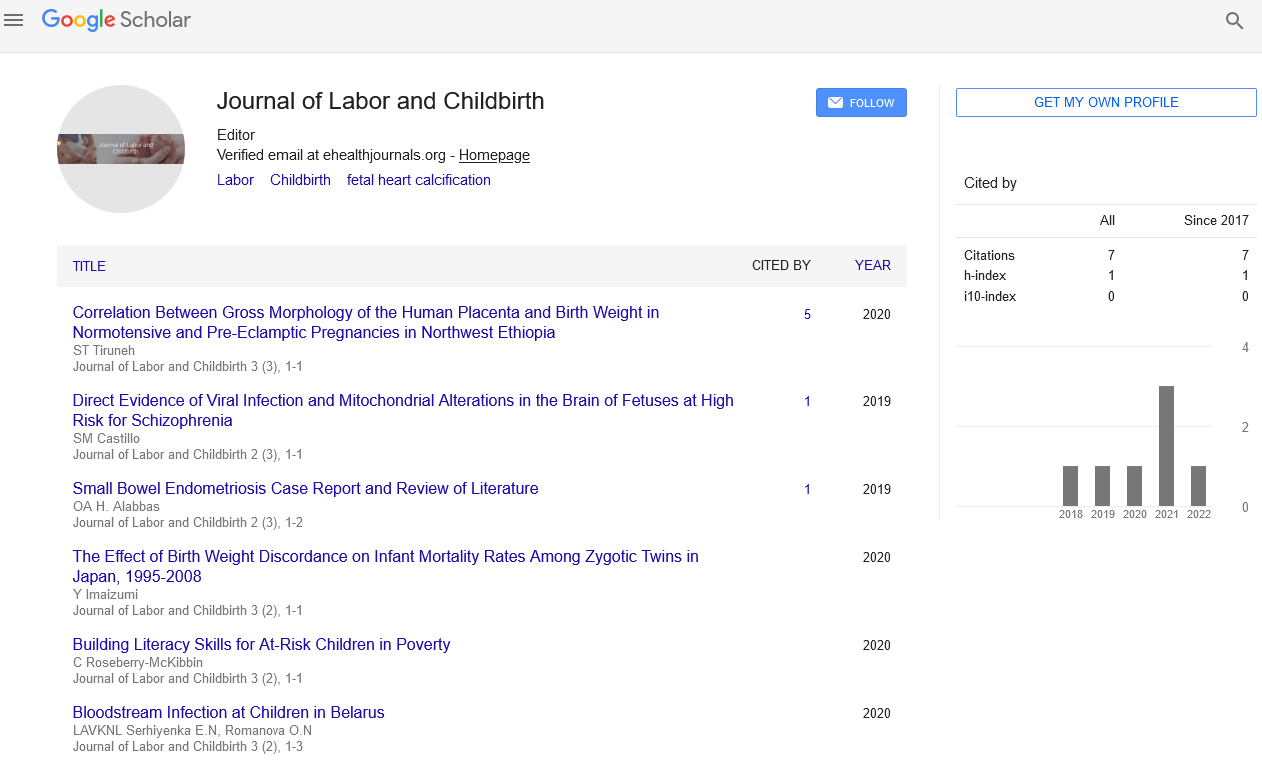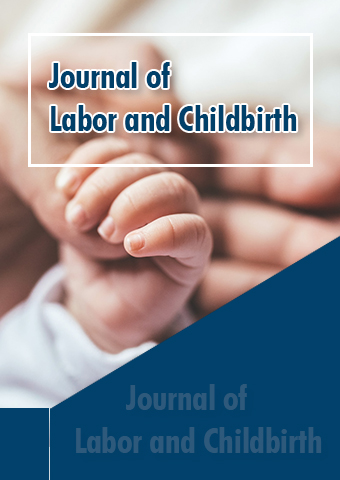Perspective - Journal of Labor and Childbirth (2023) Volume 6, Issue 6
Fluctuation of Hormones during Pregnancy
- Corresponding Author:
- Shefaly Shorey
Department of Gynecology,
Rusheed University,
Tengah,
Singapore
E-mail: nursh@gmail.com
Received: 02-Nov-2023, Manuscript No. jlcb-23-119743; Editor assigned: 07-Nov-2023, PreQC No. jlcb-23-119743 (PQ); Reviewed: 21- Nov-2023, QC No. jlcb-23-119743; Revised: 07-Dec-2023, Manuscript No. jlcb-23-119743 (R); Published: 15-Dec-2023, DOI: 10.37532/jlcb.2023.6(6).168-169
Introduction
Pregnancy is a remarkable and transformative period in a woman’s life, marked by numerous physiological and hormonal changes. These hormonal fluctuations play a vital role in supporting the development and sustenance of the fetus, while also affecting the mother’s body in various ways. Understanding these hormonal shifts is essential for both medical professionals and expectant mothers to ensure a healthy pregnancy and successful childbirth. This article explores the intricate world of fluctuating hormones during pregnancy, shedding light on their functions, sources and the impacts they have on the maternal body.
Description
Hormones and pregnancy
Hormones are signaling molecules produced by various glands and organs in the body and they regulate numerous physiological processes. During pregnancy, the endocrine system undergoes significant changes, leading to fluctuations in hormone levels. These changes are essential for creating a favorable environment for fetal development, as well as supporting the mother’s health and wellbeing.
Human Chorionic Gonadotropin (hCG): hCG is one of the earliest hormones to increase significantly during pregnancy. It is produced by the developing placenta shortly after fertilization and helps maintain the corpus luteum, a structure in the ovary that produces progesterone during the early stages of pregnancy. High levels of hCG can cause common early pregnancy symptoms such as morning sickness and breast tenderness. Its detection in pregnancy tests confirms pregnancy.
Progesterone: Progesterone is vital for maintaining the uterine lining and preventing contractions that could lead to miscarriage. Produced by the corpus luteum and later by the placenta, progesterone helps support the growth of the placenta and the fetus. It also plays a role in reducing the mother’s immune response to the fetus, preventing rejection.
Estrogen: Estrogen levels rise significantly during pregnancy and are primarily produced by the placenta. Estrogen promotes the growth and development of the fetus, especially the development of the female reproductive organs. It also affects the mother’s body by increasing blood flow to the pelvic region and causing changes in breast tissue.
Human Placental Lactogen (hPL): hPL, also known as Human Chorionic Somatomammotropin (hCS), is produced by the placenta. It helps regulate maternal glucose levels, ensuring that enough glucose is available for both the mother and the growing fetus. It also stimulates the development of the mother’s mammary glands in preparation for breastfeeding.
Prolactin: Prolactin levels increase during pregnancy and play a significant role in preparing the mother’s body for breastfeeding. Produced by the pituitary gland, prolactin prepares the mammary glands for milk production.
Hormonal changes during pregnancy
The hormonal changes that occur during pregnancy can be divided into three distinct phases:
Early pregnancy hormonal changes: In the early stages of pregnancy, hCG levels rise dramatically and are responsible for many early pregnancy symptoms, such as nausea, vomiting and breast tenderness. Progesterone levels also increase to maintain the uterine lining, preventing miscarriage. Estrogen levels begin to rise, leading to changes in the mother’s body, such as increased blood flow and breast development.
Mid-pregnancy hormonal changes: As pregnancy progresses, the placenta takes over the production of hormones like progesterone and estrogen from the corpus luteum. hPL regulates maternal glucose levels and prepares the mammary glands for lactation. Prolactin levels increase, getting the mother’s body ready for breastfeeding. These hormones collectively contribute to the growth and development of the fetus and the changes occurring in the mother’s body.
Late pregnancy hormonal changes: In the final trimester, hormone levels continue to fluctuate. Progesterone and estrogen levels reach their peaks, contributing to the preparation of the mother’s body for labor and breastfeeding. Progesterone levels begin to drop, signaling the body to initiate labor.
Hormonal effects on the maternal body
The fluctuating hormones during pregnancy have profound effects on the mother’s body, impacting various physiological systems. Here are some of the key effects:
Cardiovascular system: Increased estrogen levels lead to higher blood flow, affecting the cardiovascular system. The heart pumps more blood per minute and this can lead to an increased heart rate. Blood volume also increases to support the growing fetus.
Respiratory system: Hormonal changes can affect the respiratory system, leading to changes in lung function and breathing patterns. Progesterone, in particular, can stimulate an increase in tidal volume and promote a feeling of breathlessness in some pregnant women.
Digestive system: The hormonal changes during pregnancy can influence the digestive system. Progesterone can relax the smooth muscles of the digestive tract, leading to slower transit times and an increased risk of constipation. The relaxation of the lower esophageal sphincter can cause heartburn and acid reflux.
Musculoskeletal system: The hormone relaxin, produced by the corpus luteum and the placenta, plays a role in relaxing the uterine muscles and supporting implantation. Relaxin can also relax the ligaments and joints in the body, potentially leading to increased joint laxity and the risk of musculoskeletal issues.
Immune system: Immune responses are modulated during pregnancy to prevent the mother’s body from rejecting the fetus. Hormonal changes, including increased levels of progesterone and cortisol, can suppress the immune system to some extent. This suppression helps protect the developing fetus but may also make the mother more susceptible to infections.
Renal system: The kidneys experience increased workload during pregnancy to filter waste products from both the mother and the fetus. Hormonal changes can influence the production of urine and electrolyte balance.
Reproductive system: The reproductive system undergoes significant changes during pregnancy. Hormones like progesterone and estrogen are critical for maintaining the uterine lining and supporting fetal development. As pregnancy advances, hormonal changes prepare the body for labor, including the softening and thinning of the cervix.
Conclusion
Pregnancy is a remarkable journey marked by significant hormonal fluctuations that are essential for fetal development and the well-being of the mother. These hormones orchestrate numerous changes in the mother’s body, affecting various physiological systems. While these fluctuations are a normal part of pregnancy, imbalances can lead to complications that require medical attention. Understanding the role of hormones in pregnancy and being aware of the potential complications can help ensure a healthy and successful pregnancy journey for both mother and baby. It is essential for expectant mothers to maintain open communication with healthcare providers throughout their pregnancy to monitor and manage hormonal changes effectively.

